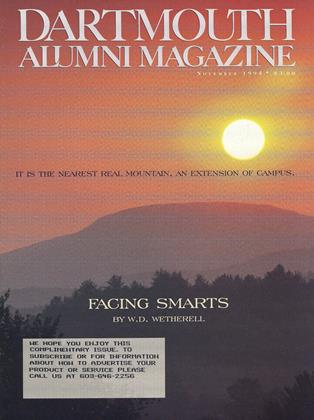SOULS, SHOPPING, AND DUELING PROTAGONISTS.
Ralph Ellison, Invisible Man (Vintage, 1990) First published in 1952, this darkly comic and classic novel about an African-American protagonist's journey (wild goose chase?) to find a place in American society becomes more complex and intriguing every time I read it.
Patricia Williams, The Alchemy of Race and Rights (Harvard University Press, 1991) Blending memoir and critical legal theory, a law professor talks about teaching, the American legal system, shopping, and the implicit philosophies that underlie our everyday thinking about "race" and gender. The book ends with an anecdote about East Wheelock Street.
Nella Larsen, Quicksand and Passing (Rutgers University Press, 1988) Two novellas about middle-class African-American women in the Harlem Renaissance. First published in 1927, then "lost" until the early seventies, Larsen's prose is some of the finest of the Harlem Renaissance.
W.E.B. DuBois, The Souls of Black Folk (first published 1903, various subsequent reprints) Perhaps the seminal work on the place of "race" in twentieth-century American culture.
Trey Ellis, Platitudes (Vintage, 1988) A satirical and often contioversial novel about the contemporary politics of African-American literary representation. Ellis's dueling protagonists are parodies of writers Ishmael Reed and Alice Walker.
bell hooks, Black Looks: Race and Representation (South End Press. 1992)—In a collection of essays on contemporary American culture, hooks takes up topics ranging fromToni Morrison to Madonna, John Waters to Spike Lee, James Baldwin to Shirley Chisholm. She is constantly looking to form newer and stronger coalitions across, racial, ethnic, and gender lines.
David Levering Lewis, editor, The Portable Harlem Renaissance Reader (Viking/Penguin, 1994) Finally a book that contains much of the seminal prose and poetry of the Harlem Renaissance! Lewis, a historian who won a Pulitzer Prize for his recent biography of DuBois, collects many of the important essays and poems of the period; he also provides representative excerpts from much of the fiction. This is a great place to start thinking about the period. Lewis also provides a succinct introduction to the collection along with a chronology.
Favor
 View Full Issue
View Full Issue
More From This Issue
-
 Feature
FeatureLooking for Mister Right Stuff
November 1995 By Jane Hodges '92 -
 Feature
FeatureNUMBER 3
November 1995 By Brooks Clark '78 -
 Cover Story
Cover StoryFACING SMARTS
November 1995 By W.D.Wetherell -
 Feature
FeaturePeter Smith's Tribal Links
November 1995 By Robert Sullivan '75 -
 Feature
FeatureSentimental Sap
November 1995 By Robert K. Nutt '49 -
 Article
ArticleDr. Wheelock's Journal
November 1995 By "E. Wheelock"







